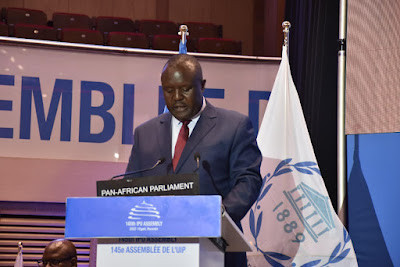|
Getting your Trinity Audio player ready…
|
The President of the Pan-African Parliament (PAP), H.E. Hon. Chief Fortune Charumbira has told global Parliamentarians gathered in Kigali, Rwanda, for the 145th Assembly of the Inter-Parliamentary Union (IPU), to go beyond rhetoric and utilize their budgetary powers to fast-track gender equality and mainstreaming around the world.
The leader of the African continental Parliament made the call as he addressed the Assembly of the IPU’s General Debate on: “Gender equality and gender-sensitive parliaments as drivers of change for a more resilient and peaceful world.” H.E Chief Charumbira urged legislators to self-introspect and critically assess the contribution of Parliaments in advancing gender equality. He further remarked that providing positive answers to pertinent questions on the role of parliamentarians will strengthen the ability and attitude towards gender equality and, ultimately, foster peace and sustainable development.
“The question, therefore, is: Are we putting our money where our mouth is? Gender equality and gender mainstreaming cannot be achieved by mere political rhetoric without the requisite budgetary support which, in itself, is a reflection of the political will to promote gender parity. Do our national Budgets reflect our commitment to gender parity?,” asked H.E Hon. Chief Charumbira.
He continued: “As Parliaments charged with the power of the purse, are we analysing these budgets with a gender lens? Do we have the capacity to analyse these budgets with a gender lens and ensure that the differential needs of women, men, boys and girls are catered for before we pass our respective national budgets?”
After recalling the mandate of the PAP and signalling the institution’s return to full functionality, following the election of the new Bureau in June 2022, the President of the PAP briefed the Assembly of the IPU on the initiatives undertaken by the legislative organ of the African Union to strengthen and consolidate efforts to empower women through meaningful participation of women and equal partnership in driving development in Africa.
“As the Pan-African Parliament, in addition to the Women’s Caucus and the Committee on Gender, Family, Youth and People with Disability, which seek to advance the common cause of women on the continent, we have created space for an annual Women’s Conference at every October Plenary Session, through which the PAP is able to harness the enormous potential of constructive engagement of African women to Africa’s development agenda.”
“Our theme for this year’s conference is “Women Empowerment and Inclusion in Governance.” We undertake to use that opportunity to self-introspect, guided by the IPU Plan of Action on Gender-Sensitive Parliaments, and come up with concrete proposals to further promote gender equality on the continent and make the PAP as an institution more gender sensitive.
Citing some of the concrete actions taken by the PAP in recent years, H.E Hon. Chief Charumbira highlighted fact-finding missions to assess the situation of women and girls in conflict areas including Chad (May 2006); Central African Republic (April 2007); Burkina Faso (2008); Saharawi Arab Democratic Republic (July 2011) and Sudan and South Sudan (September 2012). In a bid to increase awareness and eradicate harmful traditional practices such as female genital mutilation, the IPU Assembly was informed of the PAP’s missions to various member states including Ethiopia in 2009, which contributed to the launch of a pilot training programme for African midwives in Sudan in 2012; towards strengthening health systems, particularly in the provision of maternal health services in Africa.
Furthermore, the PAP President announced that the Parliament is expected to debate and adopt a model law on gender parity during the upcoming October Plenary Session, which he hopes will be used as a benchmark by African countries in improving national legislation to ensure the promotion of gender equality.
SOURCE: AFRICAN PARLIAMENTARY NEWS
